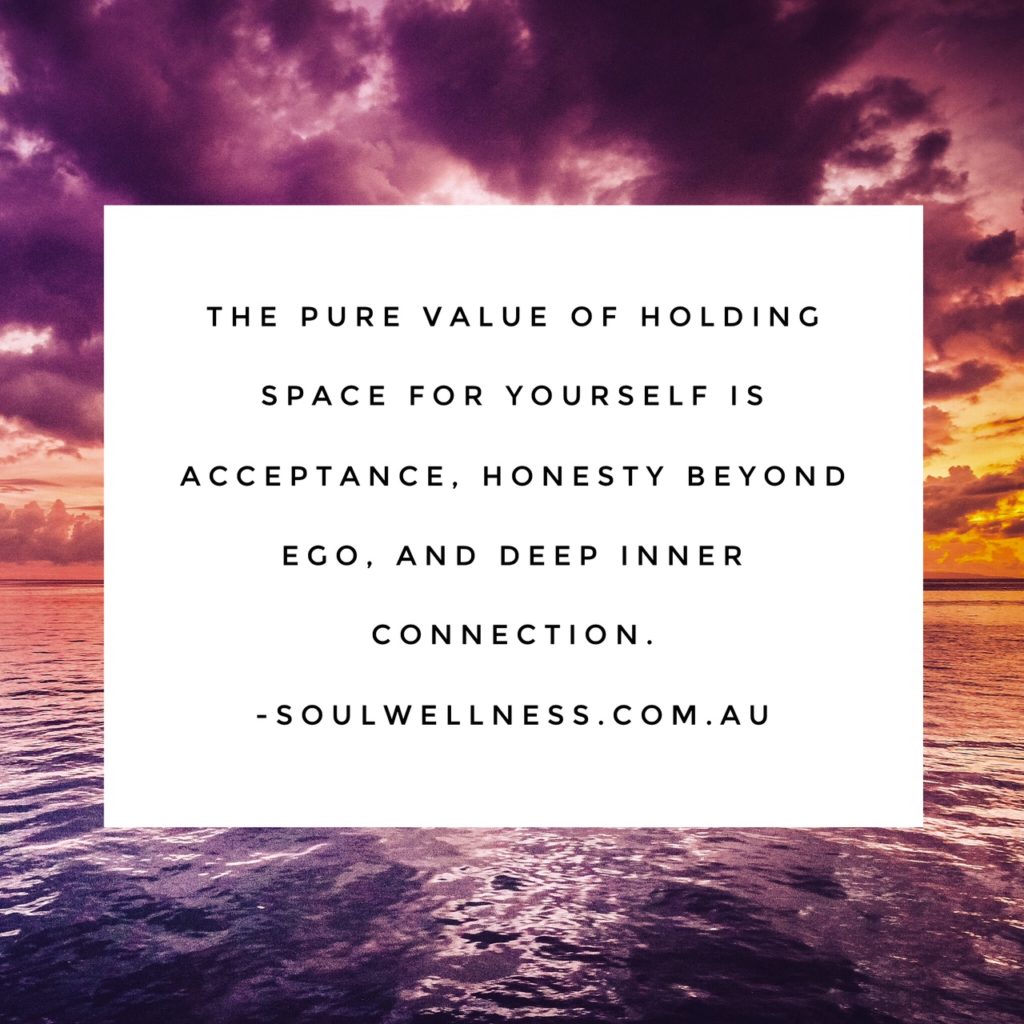A few weeks ago my story medicine friend, Kate Erlenbusch, asked a collection of people (myself included) to contribute to a post she was about to write.
Her desire was to illuminate and clarify what the term ‘holding space’ meant. You can catch her post here.
It was a brilliant question to ponder.
The phrase ‘holding space’ is so widely used in the healing community, though admittedly when I first heard it, I had no idea what it meant.
It was the early days of practicing kinesiology, and at the end of a session my client said “you hold space so well, thank you.”
It took me awhile to realise what she meant was; she’d felt safe, seen and heard.
That all of what she’d shared had been welcomed, rather than judged: her fears, thoughts, beliefs and insecurities… and because of that experience, she’d been able to experience a sense of freedom that comes from honest expression.
When I reflected on how I knew how to ‘hold space’ for her, I realised I’d been inadvertently taught to; by every person who had ever received me compassionately, especially when I was in my most vulnerable states.
I recognised the presence and focus they held.
Saw the strength and compassion in their eyes.
Heard the wisdom and truth in their words.
And then when it was my turn to hold others, I drew strength from their examples.
Holding space for other had been the easiest part; because I’ve always loved well, understood well, and felt compassion for others pain, knowing how to navigate the path forward, so you don’t get stuck in the pain.
The difficult aspect of ‘holding space’ was learning how to do it for myself.
This is a craft that has taken years to soften into.
The key to holding space for self is the ability to see all that you fear and deem unworthy or painful, anything you feel emotionally charged by, through the eyes of compassion, rather than judgement.
This takes courage, curiosity, time and patience. Especially when the same patterns keep cycling back to be re-visited.
When I reflect on the times I’ve most effectively held space for myself, I know I’ve embodied two archetypes most obviously; the wise woman/mother, and the maiden.
The wise woman says “go ahead, I’m listening” with a strength and compassion that imbues safety.
In return the maiden whispers her fears and insecurities.
There’s an honest conversation, back and forth, and then when all is said and done; liberation, relief, release.
The sense of feeling a little more powerful after an emotional wound has been acknowledged, especially when you’re open to how holding space for yourself will transform your experience in that moment.
The pure value of holding space for yourself is acceptance, honesty beyond ego, and deep inner connection.
You end up walking through the world with less judgement clouding your vision, less insecurity and struggle.
When you can do this for yourself, you’re more able to hold space for others, so they can be whatever version of themselves they need to be in your presence.
I also believe we consistently hold space for each other. Consciously, or otherwise.
Sometimes we’re more effective at it than at other times, and it comes across in our energy and in our words.
Do we control and shut others down, or do we allow those around us to show up however they need to?
This is a complex topic, though this is the kind of space-holding I believe we’re constantly contributing to.
It’s similar to the concept of being a ‘good manifester’. We’re constantly manifesting, though are we manifesting most effectively? It’s the same for how we hold space.
Develop The Craft Of Holding Space For Yourself
Practice Being Completely Honest and Present With Yourself.
When you feel emotionally charged, be truthful about how you’re feeling.
Don’t judge it. Don’t put a fake-positive spin on it.
Once you’ve been honest and present with how you’re feeling, wait and see the transformation that unfolds.
Know What Your Recurring Patterns/Perceptions Are.
When you’re aware of the recurring patterns/perceptions that keep you locked in a cycle of struggle, you’ll know when to hold space for yourself and go into an honest conversation. These patterns are also invitations for spiritual and emotional growth.
For example, one of my recurring patterns is holding back on asking for what I want and need. It takes a bit of courage to articulate what I want, though every single time I do, I feel a little more liberated.
Having awareness of this pattern, I now know the emotional cues that alert me to when I’m not asking for what I want and I can go into an honest conversation about it.
Be Aware of Your Boundaries.
Keep a close eye on this. Are you over-giving or undervaluing yourself, your time, your knowledge, your kindness, your trust?
Are you beginning to feel resentful, or powerless, in a particular area of your life? Are you feeling overly responsible for others?
On the flip side, are you under-giving/contributing to/connecting with, life?
Keep a healthy eye on your personal-boundaries and adjust them accordingly.
When your boundaries are in place, you’ll be more likely to notice where you need to hold space for yourself.
Sometimes Holding Space For Yourself Means Gathering Support.
Last week I was reminded that to hold space for myself properly, I needed to accept the support that was being offered. And that I could call upon that support whenever I genuinely needed it.
What I found was, rather than becoming my crutch as it may have in years gone by, the support became my witness, where I could safely drop into myself and all I needed to feel.
Who do you need to ask/accept support from?
Not so they can be your crutch, but rather, so they can be your witness.
Much love and soul wellness,
Melissa xx
Feel like you need personal guidance and support? I offer 1:1 Kinesiology sessions in Elwood, and via Skype.
Book your appointment by clicking here.
Also, I wrote an eCourse 31 Days of Soul Wellness, specifically designed to ignite clarity and activate self-healing. You can get that here.


